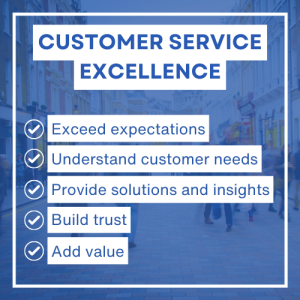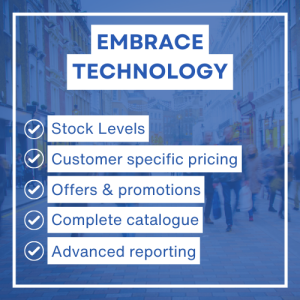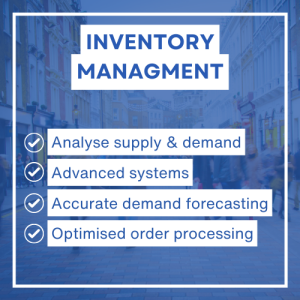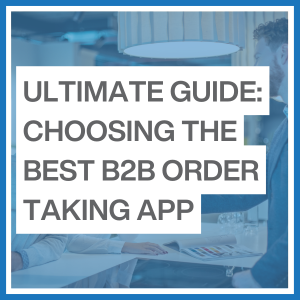How can B2B distributors stay ahead of the competition?

B2B distributors operate in a constantly evolving market. Staying ahead of the competition is not just a goal. It’s a necessity.
Success hinges on the ability to adapt, innovate, and exceed expectations.
This blog post delves into key strategies that can propel B2B distributors to the forefront of their industries.
Customer service excellence
Exceeding expectations: If you want to stay ahead of the competition, surpassing client expectations is key. This involves not just delivering what is promised but also going the extra mile. Providing timely, efficient, and innovative solutions that proactively address future needs will increase customer satisfaction and loyalty.
Understanding customer needs: Creating an environment where every client’s needs are deeply understood and addressed is vital. Tailored services that reflect an understanding of each client’s unique business context show you’re not just a supplier, but a partner in their success.

Providing solutions and insights: Offering solutions is just the beginning. Imparting valuable insights that help clients increase sales is what can differentiate your service. This could be data-driven product recommendations, or trend analyses that inform their strategic decisions.
Building trust and relationships: Long-term relationships are founded on trust, cultivated through consistent and reliable service. Showcasing a commitment to your clients; success and being there as a dependable resource fosters a bond that goes beyond typical business transactions.
Adding value: Every interaction with your customer should aim to add value to their business. Whether it’s through innovative software features, exceptional support, or strategic advice. Ensuring your services contribute to their growth and efficiency reinforces your role as an indispensable asset.
Embrace technology

Up-to-date stock levels: Using a sales apps that provide real-time stock information is crucial for staying competitive. Sales reps equipped with this data can confidently make promises to clients, knowing the information is current and accurate. This capability not only enhances customer trust but also minimises the risk of over-promising and under-delivering.
Customer specific pricing: Giving your reps and agents access to customer-specific pricing within their sales app gives them the power to complete sales there and then, without the need for Head Office intervention. It also removes the risk of pricing errors, ambiguity and customer confusion. This personalisation caters directly to the unique needs of each customer.
Head office designed offers and promotions: Sales apps which integrate offers and promotions designed by your head office ensure consistency in marketing strategies, while empowering sales reps with additional tools to close deals. This will also come into its own when trying to encourage customers to branch out into stocking your newer products or swiftly moving a glut of excess SKUs.
Comprehensive product catalogues: The ability to present a full product catalogue, complete with photos, videos, and PDFs, is invaluable. It not only will visually engaging clients, but also provides them with a wealth of information at their fingertips. Enhancing the sales experience and positioning your business as technologically adept and customer-focused.
Advanced reporting for informed decisions: Sales apps with advanced reporting and data filtering capabilities equip your team with the insights needed to make informed decisions. This feature enables a deeper understanding of market trends, customer preferences, and sales performance, guiding strategic decisions that keep your business ahead.
Data-Driven Recommendations: Utilising product sales data to make informed recommendations is a game-changer. Sales reps can use this data to suggest products that are more likely to resonate with clients, offering a personalised and strategic service that not only meets current needs but also anticipates their future needs.
Agile market adaptation
Continuous industry monitoring: Staying ahead in B2B distribution necessitates a constant vigilance of industry trends. By actively monitoring market changes and consumer behaviour, your business can swiftly adapt to new opportunities and emerging challenges. This ongoing attentiveness ensures you’re always one step ahead, ready to evolve with the market.
Flexible business model: Adopting a flexible business model is key to thriving in a dynamic market. This flexibility allows for rapid adjustments in strategy, whether it’s shifting product focus, altering supply chain logistics, or changing marketing tactics. A business model that can quickly pivot in response to market demands is essential for maintaining a competitive edge.

Culture of innovation: Cultivating a culture of innovation within your organisation encourages creative problem-solving and the exploration of new ideas. This environment inspires your team to think beyond conventional boundaries, leading to breakthrough strategies and innovative solutions that set your business apart in the competitive B2B landscape.
Quick decision making through technology: Investing in technology that enables fast and informed decision-making is crucial. Tools that provide real-time data and analytics empower your team to make decisions quickly, confidently, and in alignment with current market dynamics. This capability is invaluable when timing can be the difference between capitalising on an opportunity or missing out.
Strategic inventory management

Analysing supply and demand: A critical aspect of staying competitive is the meticulous analysis of supply and demand trends. Understanding these patterns allows B2B distributors to align their inventory with market needs, ensuring they are well-equipped to meet customer demands without the burden of excess stock. This careful balancing act is essential for operational efficiency and customer satisfaction.
Advanced inventory systems: Implementing advanced inventory management systems is a transformative step for B2B distributors. These systems provide precise and real-time insights into inventory levels, enabling better control over stock and more informed purchasing decisions. Such technological integration streamlines operations and significantly reduces the risks of stock shortages or surpluses.
Accurate demand forecasting: Utilising data for demand forecasting is an essential for strategic inventory management. By predicting future demand based on historical sales data, market trends, and seasonal fluctuations, distributors can proactively manage their inventory. This foresight ensures they are always prepared for shifting market demands.
Optimised order processing: Another key component is the optimisation of order processing. Efficient order management, facilitated by inventory systems, ensures quick and accurate fulfilment of customer orders. This efficiency not only boosts customer satisfaction but also enhances the overall agility of the business, keeping it responsive and competitive.
Conclusion
Staying ahead in the competitive world of B2B distribution requires a multifaceted approach.
By achieving all these points, distributors can position themselves for continued success.
Remember, the key is not just to react to the competition but to anticipate and innovate, setting the standards for others to follow.
If you’d like to know how our ecosystem of B2B sales software for distributors can help you stay ahead of the competition, click on the green ‘Book a Demo’ button at the top of this page. Or, drop us an email using [email protected].
Related Articles




